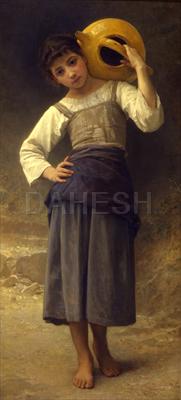William-Adolphe Bouguereau (French, 1825–1905)
The Water Girl, or Young Girl Going to the Spring, 1885
Oil on canvas, 63 1/8 x 28 7/8 in.
Signed and dated lower left: W. BOUGUEREAU-1885
1995.1

One of Bouguereau’s favorite motifs was the idealized peasant girl dreamily engaged in rustic activities. The innocence and simple grace of this subject (cleaner than her real-life counterparts would have been) epitomize the sentimental, non-threatening peasant archetype especially preferred by Bouguereau’s upper-class and American patrons. The artist used a young girl from his native village of La Rochelle as a model, but such images owe less to actual rural life than to Bouguereau’s knowledge and love of the classical tradition. His figures echo ancient Greek and Roman statuary (which he studied for several years in the Eternal City after winning the Prix de Rome in 1850), as well as the Neoclassicism of Jean-Auguste-Dominique Ingres, whose famous painting of a nude nymph entitled The Source (1856, Musée d’Orsay, Paris) served as direct antecedent for The Water Girl.


